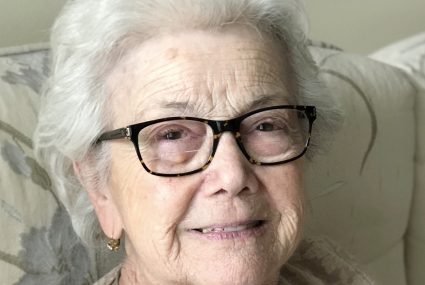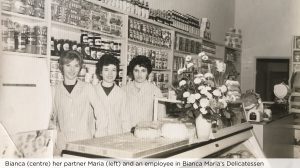International Women’s Day on March 8, is an opportunity celebrate the achievements of the women who live and work in Bria residences — like Bianca Polo, a resident at The Waterford in Tsawwassen. Here is her story.
Bianca Polo was 13 years old when she felt the impact of World War II—that was the year she went to work.
“My mom, she was cooking and keeping house for a big house, a big property,” recalls Bianca who grew up in Arzene, a small town in the province of Pordenone, Italy. “They had a boy—21 years-old—to bring the wood in the winter for the stoves in every room. The war comes, the boys go to war, and they take me, a 13-year-old girl to do the job.”
After the war she found work in Geneva, Switzerland cooking for a wealthy couple. In the spring of 1952, as the snow thawed and everyone ventured outside into the fresh spring air, she met Fernando, the man who became her husband. He had also come from Italy — they grew up only 18 km apart — and now worked as a waiter in a hotel.
They married and continued to work hard, until one day Fernando met a hotel guest who changed their lives.
The guest, a man from Vancouver, was at a two-month-long International Labour Conferrence. He liked Fernando and took every opportunity to convince him to immigrate. “He talked and talked with my husband about work,” says Bianca. “‘Why don’t you come to Canada, it could be better than this. Every day at the table he would say this to my husband.”
At the end of two months, he convinced Fernando and Bianca and also agreed to sponsor their immigration to Canada. A year later, with $700 in their pockets, they got on a ship, then a train, and at last, arrived in Vancouver.
Fernando went to work the day after they arrived. He spoke English well and quickly learned his new trade in the plywood mill. Bianca, however, struggled with the transition. “It was very hard; I cried when he was out, I tried to be jolly when he was in.”
Bianca spoke no English, and quickly sought out friends who had previously immigrated. The area around Commercial Drive in the Grandview-Woodland part of Vancouver had become an Italian enclave; home to Italian grocery stores, cafés, Catholic churches, and many newly immigrated families. Bianca and Fernando rented a suite for $35 at the corner of Nanaimo St. and 5th Ave. and promptly started a family.
A baby girl arrived in 1957, and their suite was immediately too small.“We had $1,500 in the bank; what we bring from Italy and what my husband had gained. We see a house that was $13,000. $3000 down payment. We really, really like this house, but we only have $1,500.”
A friend of a friend came to the rescue and loaned the little family the extra $1,500. They bought their first house on Turner Street, just a few blocks off Hastings Street and from the location of the store that would become Bianca’s legacy.
Bianca’s son was born in 1960. Bianca’s mother regularly wote from Italy; she was sad and alone there by herself. “So, my husband said, “‘Why she don’t come to us. It’s enough she looks after the babies. You can do something.’”
She had been in Vancouver for four years, and still spoke no English, but she didn’t need to at her new job at a busy Italian grocery store. With no experience and only a fifth-grade education, Bianca settled in quickly.
Fridays and Saturdays were the busiest days. Husbands waited in the car while wives shopped. Eventually, the women would emerge carrying 100 lb bags of flour, 20 lb boxes of pasta, bottles of olive oil, cans of tomatoes sauce, links of Italian sausage, and wheels of cheese.
When the store opened a new location on Commercial Drive, Bianca was sent to manage it. But there were issues. Bianca didn’t feel her customers got the service they deserved, and she was helpless to fix it.
“We are connected to the big store,” she explains. “I have to order the things I need from the big store. On Friday they sent the order, and I can’t control what I get. Many times I didn’t find what I ordered.”
Her customers weren’t getting what they wanted, and that was unacceptable to Bianca. She made her concerns known, but there was no change. One day, Bianca and four co-workers went to meet with the manager.
“We talk,” recalls Bianca. “Then, we left, all at once.” All five ladies quit.
Now Bianca and her friends were out of work, and finding another job wasn’t easy. Her former customers had the solution. “Why don’t you open a shop. We’ll come to you if you open!”
She and her co-worker Maria found a location only a block away from their former employers original store. The ladies had a good reputation, and three local importers gave them credit to get going.
“So we opened the store. All the people come to us! They said to us, ‘You are the ones who work for us!’”
Bianca Maria’s Delicatessen opened on January 4, 1963. It was a busy shop, open six days a week. People came because of the name: Bianca Maria. They knew those names; they knew they meant quality and service
Running a small business is hard work — paying bills, paying staff, making orders, serving customers — but Bianca was up to the task. Years working for the competition had equipped her. She suspects she also had an advantage: “My mom’s family were in commerce, my dad’s side, they were in commerce; I think it is in my blood.”
After three years Maria moved back to Italy and Bianca bought her out. Four years later Bianca’s mother moved back to Italy, and without a partner at work, and without her mother at home, she was stretched thin. In 1970, she sold her business for $25,000.
Commerce and hard work were in her blood, and she continued to work part-time for the store, lending her labour, name and reputation until she retired in 1987.
Today Bianca Maria’s sits in the same place on East Hasting St. The little store stands as a symbol of tenacity, hard work and courage, and Bianca’s story is one to celebrate on International Women’s Day and all year long.
These days Bianca, a resident of The Waterford, a Bria seniors’ community in Tsawwassen, BC, visits at least once a year. Family members from out of town ask to make the pilgrimage to the shop with her. They browse through the Italian sausage, tomato sauce, wheels of cheese, and handmade pasta and marvel at the legacy of this incredible woman.



Comments